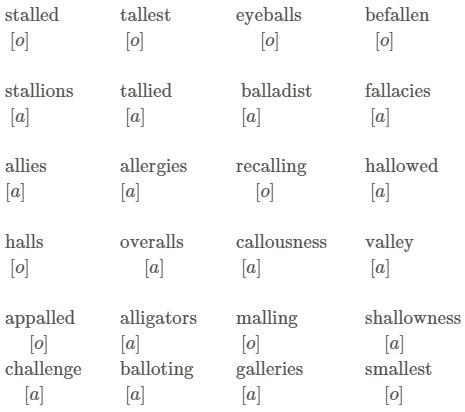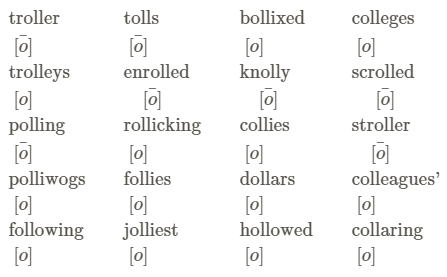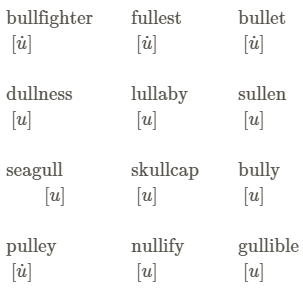2.22: The Consonant Sound [l]
- Page ID
- 7071
\( \newcommand{\vecs}[1]{\overset { \scriptstyle \rightharpoonup} {\mathbf{#1}} } \)
\( \newcommand{\vecd}[1]{\overset{-\!-\!\rightharpoonup}{\vphantom{a}\smash {#1}}} \)
\( \newcommand{\dsum}{\displaystyle\sum\limits} \)
\( \newcommand{\dint}{\displaystyle\int\limits} \)
\( \newcommand{\dlim}{\displaystyle\lim\limits} \)
\( \newcommand{\id}{\mathrm{id}}\) \( \newcommand{\Span}{\mathrm{span}}\)
( \newcommand{\kernel}{\mathrm{null}\,}\) \( \newcommand{\range}{\mathrm{range}\,}\)
\( \newcommand{\RealPart}{\mathrm{Re}}\) \( \newcommand{\ImaginaryPart}{\mathrm{Im}}\)
\( \newcommand{\Argument}{\mathrm{Arg}}\) \( \newcommand{\norm}[1]{\| #1 \|}\)
\( \newcommand{\inner}[2]{\langle #1, #2 \rangle}\)
\( \newcommand{\Span}{\mathrm{span}}\)
\( \newcommand{\id}{\mathrm{id}}\)
\( \newcommand{\Span}{\mathrm{span}}\)
\( \newcommand{\kernel}{\mathrm{null}\,}\)
\( \newcommand{\range}{\mathrm{range}\,}\)
\( \newcommand{\RealPart}{\mathrm{Re}}\)
\( \newcommand{\ImaginaryPart}{\mathrm{Im}}\)
\( \newcommand{\Argument}{\mathrm{Arg}}\)
\( \newcommand{\norm}[1]{\| #1 \|}\)
\( \newcommand{\inner}[2]{\langle #1, #2 \rangle}\)
\( \newcommand{\Span}{\mathrm{span}}\) \( \newcommand{\AA}{\unicode[.8,0]{x212B}}\)
\( \newcommand{\vectorA}[1]{\vec{#1}} % arrow\)
\( \newcommand{\vectorAt}[1]{\vec{\text{#1}}} % arrow\)
\( \newcommand{\vectorB}[1]{\overset { \scriptstyle \rightharpoonup} {\mathbf{#1}} } \)
\( \newcommand{\vectorC}[1]{\textbf{#1}} \)
\( \newcommand{\vectorD}[1]{\overrightarrow{#1}} \)
\( \newcommand{\vectorDt}[1]{\overrightarrow{\text{#1}}} \)
\( \newcommand{\vectE}[1]{\overset{-\!-\!\rightharpoonup}{\vphantom{a}\smash{\mathbf {#1}}}} \)
\( \newcommand{\vecs}[1]{\overset { \scriptstyle \rightharpoonup} {\mathbf{#1}} } \)
\(\newcommand{\longvect}{\overrightarrow}\)
\( \newcommand{\vecd}[1]{\overset{-\!-\!\rightharpoonup}{\vphantom{a}\smash {#1}}} \)
\(\newcommand{\avec}{\mathbf a}\) \(\newcommand{\bvec}{\mathbf b}\) \(\newcommand{\cvec}{\mathbf c}\) \(\newcommand{\dvec}{\mathbf d}\) \(\newcommand{\dtil}{\widetilde{\mathbf d}}\) \(\newcommand{\evec}{\mathbf e}\) \(\newcommand{\fvec}{\mathbf f}\) \(\newcommand{\nvec}{\mathbf n}\) \(\newcommand{\pvec}{\mathbf p}\) \(\newcommand{\qvec}{\mathbf q}\) \(\newcommand{\svec}{\mathbf s}\) \(\newcommand{\tvec}{\mathbf t}\) \(\newcommand{\uvec}{\mathbf u}\) \(\newcommand{\vvec}{\mathbf v}\) \(\newcommand{\wvec}{\mathbf w}\) \(\newcommand{\xvec}{\mathbf x}\) \(\newcommand{\yvec}{\mathbf y}\) \(\newcommand{\zvec}{\mathbf z}\) \(\newcommand{\rvec}{\mathbf r}\) \(\newcommand{\mvec}{\mathbf m}\) \(\newcommand{\zerovec}{\mathbf 0}\) \(\newcommand{\onevec}{\mathbf 1}\) \(\newcommand{\real}{\mathbb R}\) \(\newcommand{\twovec}[2]{\left[\begin{array}{r}#1 \\ #2 \end{array}\right]}\) \(\newcommand{\ctwovec}[2]{\left[\begin{array}{c}#1 \\ #2 \end{array}\right]}\) \(\newcommand{\threevec}[3]{\left[\begin{array}{r}#1 \\ #2 \\ #3 \end{array}\right]}\) \(\newcommand{\cthreevec}[3]{\left[\begin{array}{c}#1 \\ #2 \\ #3 \end{array}\right]}\) \(\newcommand{\fourvec}[4]{\left[\begin{array}{r}#1 \\ #2 \\ #3 \\ #4 \end{array}\right]}\) \(\newcommand{\cfourvec}[4]{\left[\begin{array}{c}#1 \\ #2 \\ #3 \\ #4 \end{array}\right]}\) \(\newcommand{\fivevec}[5]{\left[\begin{array}{r}#1 \\ #2 \\ #3 \\ #4 \\ #5 \\ \end{array}\right]}\) \(\newcommand{\cfivevec}[5]{\left[\begin{array}{c}#1 \\ #2 \\ #3 \\ #4 \\ #5 \\ \end{array}\right]}\) \(\newcommand{\mattwo}[4]{\left[\begin{array}{rr}#1 \amp #2 \\ #3 \amp #4 \\ \end{array}\right]}\) \(\newcommand{\laspan}[1]{\text{Span}\{#1\}}\) \(\newcommand{\bcal}{\cal B}\) \(\newcommand{\ccal}{\cal C}\) \(\newcommand{\scal}{\cal S}\) \(\newcommand{\wcal}{\cal W}\) \(\newcommand{\ecal}{\cal E}\) \(\newcommand{\coords}[2]{\left\{#1\right\}_{#2}}\) \(\newcommand{\gray}[1]{\color{gray}{#1}}\) \(\newcommand{\lgray}[1]{\color{lightgray}{#1}}\) \(\newcommand{\rank}{\operatorname{rank}}\) \(\newcommand{\row}{\text{Row}}\) \(\newcommand{\col}{\text{Col}}\) \(\renewcommand{\row}{\text{Row}}\) \(\newcommand{\nul}{\text{Nul}}\) \(\newcommand{\var}{\text{Var}}\) \(\newcommand{\corr}{\text{corr}}\) \(\newcommand{\len}[1]{\left|#1\right|}\) \(\newcommand{\bbar}{\overline{\bvec}}\) \(\newcommand{\bhat}{\widehat{\bvec}}\) \(\newcommand{\bperp}{\bvec^\perp}\) \(\newcommand{\xhat}{\widehat{\xvec}}\) \(\newcommand{\vhat}{\widehat{\vvec}}\) \(\newcommand{\uhat}{\widehat{\uvec}}\) \(\newcommand{\what}{\widehat{\wvec}}\) \(\newcommand{\Sighat}{\widehat{\Sigma}}\) \(\newcommand{\lt}{<}\) \(\newcommand{\gt}{>}\) \(\newcommand{\amp}{&}\) \(\definecolor{fillinmathshade}{gray}{0.9}\)Overview of the Consonant Sound [l]
More than nine times out of ten [l] is spelled <l>.
Examples
You can hear the sound [l] at the beginning and end of the word lull.
Review
- Underline the letters that spell [l] in each of the following words:
\begin{align*}
& \text{ability} && \text{symbol} && \text{fertilizer} && \text{lieutenant}\\
& \text{wrinkle} && \text{bungle} && \text{regular} && \text{national}\\
& \text{freely} && \text{cathedral} && \text{guilty} && \text{leisure}\\
& \text{annihilate} && \text{delegate} && \text{horrible} && \text{angrily}\\
& \text{awhile} && \text{elaborate} && \text{jungle} && \text{league}
\end{align*} - Now sort the twenty words into these three groups:
Words with [l]. . . in the front in the middle at the end - How is [l] spelled in all of these words? _______.
- Show Answer
-
- \begin{align*}
& abi\underline{l}ity && symbo\underline{l} && ferti\underline{l}izer && \underline{l}ieutenant \\
& wrink\underline{l}e && bung\underline{l}e && regu\underline{l}ar && nationa\underline{l} \\
& free\underline{l}y && cathedra\underline{l} && gui\underline{l}ty && \underline{l}eisure \\
& annihi\underline{l}ate && de\underline{l}egate && horrib\underline{l}e && angri\underline{l}y \\
& awhi\underline{l}e && e\underline{l}aborate && jung\underline{l}e && \underline{l}eague
\end{align*} -
Words with [l]. . . in the front in the middle at the end lieutenant ability wrinkle leisure freely awhile league annihilate symbol delegate bungle elaborate cathedral fertilizer horrible regular jungle guilty national angrily - How is [l] spelled in all of these words? <l>.
- \begin{align*}
Explore More
Word Squares. This squares contains the following twelve words, each of which contains the sound [l] spelled <l>. We've shown you where the <l>'s go in the words:
\begin{align*}
& \text{6 Letters:} && \text{7 Letters:} && \text{8 Letters:} && \text{10 Letters:}\\
& \text{awhile} && \text{ability} && \text{horrible} && \text{annihilate}\\
& \text{bungle} && \text{angrily} && \text{national} && \text{lieutenant}\\
& \text{jungle} && \text{wrinkle} && \text{ } && \text{ }\\
& \text{league} && \text{ } && \text{ } && \text{ }\\
& \text{symbol} && \text{ } && \text{ } && \text{ }
\end{align*}
- Show Answer
-
[l] Spelled <l> or <ll>
The sound [l] can be spelled <ll> for a few reasons, including simple addition and assimilation.
Examples
Sometimes when you add a suffix that starts with <l> to a stem that ends in <l>, you get <ll> because of simple addition: heel + less = heelless.
Sometimes when you add a prefix to a word that starts with <l>, the last letter of the prefix assimilates: com + lect = collect.
Review
- Underline the letters that spell [l] in the following words.
\begin{align*}
& \text{finally} && \text{collie} && \text{taillight} && \text{dollar}\\
& \text{cathedral} && \text{collapse} && \text{allegiance} && \text{ability}\\
& \text{respectfully} && \text{allies} && \text{annually} && \text{shallowness}\\
& \text{jewellike} && \text{followers} && \text{college} && \text{illogically}\\
& \text{ballads} && \text{illustration} && \text{lieutenant} && \text{colleague}
\end{align*} - Sort these twenty words into these two groups.
Words in which [l] is spelled ... <l> <ll> - Seven of the seventeen words with [l] spelled <ll> have the <ll> in them because of assimilation in the prefix. In three of them the <m> in com- has changed to an <l>. In two the <d> in ad- has changed to an <l>. In two the <n> in in- has changed to an <l>. Find these seven words and sort them into these three groups.
Words with ... ad- assimilated to al- com- assimilated to col- in- assimilated to il- - Five of the sixteen words that contain <ll> have two <l>s because in them a suffix that starts with an <l> has been added to a stem that ends with <l>. Find the five and sort them into these two groups.
Words with the suffix... -like -ly - Among the words with [l] spelled <ll> there is one compound word in which the <ll> is due to simple addition. That word is ______________.
- There are also five words with [l] spelled <ll> because of the VCC pattern at work. List them.
- Show Answer
-
- \begin{align*}
& fina\underline{ll}y && co\underline{ll}ie && tai\underline{ll}ight && do\underline{ll}ar \\
& cathedra\underline{l} && co\underline{ll}apse && a\underline{ll}egiance && abi\underline{l}ity \\
& respectfu\underline{ll}y && a\underline{ll}ies && annua\underline{ll}y && sha\underline{ll}owness \\
& jewe\underline{ll}ike && fo\underline{ll}owers && co\underline{ll}ege && i\underline{ll}ogically \\
& ba\underline{ll}ads && i\underline{ll}ustration && \underline{l}ieutenant && co\underline{ll}eague
\end{align*} -
Words in which [l] is spelled ... <l> <ll> cathedral finally allies college lieutenant respectfully followers dollar ability jewellike illustration shallowness ballads taillight illogically collie allegiance colleague collapse annually -
Words with ... ad- assimilated to al- com- assimilated to col- in- assimilated to il- allies collapse illustration allegiance college illogically colleague -
Words with the suffix... -like -ly jewellike finally respectfully annually illogically - Among the words with [l] spelled <ll> there is one compound word in which the <ll> is due to simple addition. That word is taillight.
- There are also five words with [l] spelled <ll> because of the VCC pattern at work.
\begin{align*}
& ballads && collie && followers && dollar && shallowness
\end{align*}
- \begin{align*}
Sounds of <a> before <ll>
When the letters <ll> come at the end of a free stem, an <a> before them will spell [o].
When the <ll> comes in the middle of a free stem, an <a> before them will spell [a].
Examples
Usually the <ll> spelling follows the VCC pattern. For instance, in ballads, fellows, thrilling, dollar, and bullet, there is a short vowel in front of the <ll>, and it is always the vowel sound that it looks as if it should be. In ballads there is a short <a>; in fellows there is a short <e>; in thrilling and dollar, a short <i> and short <o>; and in bullet a short <oo>, ů.
Sometimes right in front of the <ll> you should hear the short <a> sound, [a], that the spelling suggests, but sometimes you should hear the short <o> sound, [o]. Remember: Short <a> is the vowel you hear in hat. Short <o> is the vowel you hear in hot.
Review
- Read the following words aloud. Pay special attention to the vowel sound in front of the <ll> in each one. Mark the vowel sound in front of the <ll>, as we have done with stalled.
\begin{align*}& \text{stalled} && \text{tallest} && \text{eyeballs} && \text{befallen} \\ & \quad [o] \\ & \text{stallions} && \text{tallied} && \text{balladist} && \text{fallacies} \\ \\ & \text{allies} && \text{allergies} && \text{recalling} && \text{hallowed} \\ \\ & \text{halls} && \text{overalls} && \text{callousness} && \text{valley} \\ \\ & \text{appalled} && \text{alligators} && \text{mailing} && \text{shallowness} \\ \\ & \text{challenge} && \text{balloting} && \text{galleries} && \text{smallest} \\ \\\end{align*} - Each of the twenty-four words contains a free stem plus a suffix. Analyze each one.
Word = Free Stem + Suffix Word = Free Stem + Suffix stalled = stall + ed eyeballs = eyeball + s stallions balladist allies recalling halls callousness appalled malling challenger galleries tallest befallen tallied fallacies allergies hallowed overalls valleys alligators shallowness balloting smallest - Now look at the twenty-four free stems you just found in your analysis. Sort them into this matrix.
- Show Answer
-

-
Word = Free Stem + Suffix Word = Free Stem + Suffix stalled = stall + ed eyeballs = eyeball + s stallions = stallion + s balladist = ballad + ist allies = all y+ i+ es recalling = recall + ing halls = hall + s callousness = callous + ous appalled = appal + l + ed malling = mall + ing or appall + ed challenger = challeng e+ er galleries = galler y+ i + es tallest = tall + est befallen = befall + en tallied = tall y+ i+ ed fallacies = fallac y+ i+ es allergies = allerg y+ i+ es hallowed = hallowed + ed overalls = overall + s valleys = valley + s alligators = alligator + s shallowness = shallow + ness balloting = ballot + ing smallest = small + est -
Free stems with the <all> at the end Free stems with the <all> not at the end Free stems with [a] before <ll> stallion
ally
challenger
tally
allergy
alligator
ballot
balladist
callous
gallery
fallacy
hallow
valley
shallow
Free stems with [o] before <ll> stall
hall
appal(l)
tall
overall
eyeball
recall
mall
befall
small
Sounds of <o> before <ll>
When <ll> is at the end of a free stem, an <a> right in front of it will spell a short <o> sound, as in ball, [bol]. But when the <ll> is in the middle of the stem, an <a> right in front of it will spell a short <a> sound, as in ballot, [bálət].
That's a neat little pattern, but there are a couple of misfits worth noticing. The word wall fits the pattern because it has the short <o> sound, but longer words with <wa> in front of <ll> in them don't fit: swallow, wallow, wallet, wallop.
There is a similar pattern for the spelling <oll>. Sometimes you hear a short <o>, but sometimes you hear a long <o>.
Examples
When spelling <oll>, sometimes you hear a short <o> and sometimes you hear a long <o>.
For example, following has a short <o> and enrolled has a long <o>.
Review
- Read the following words aloud, carefully. Mark the vowel sound in front of the <ll> as we have with troller.
\begin{align*}& \text{troller} && \text{tolls} && \text{bollixed} && \text{colleges} \\ & \;\,[\bar{o}] \\ & \text{trolleys} && \text{enrolled} && \text{knolly} && \text{scrolled} \\ \\ & \text{polling} && \text{rollicking} && \text{collies} && \text{stroller} \\ \\ & \text{polliwogs} && \text{follies} && \text{dollars} && \text{colleagues'} \\ \\ & \text{following} && \text{jolliest} && \text{hollowed} && \text{collaring}\\ \\\end{align*} - Each of the twenty words contains a free stem plus a suffix. Analyze each one.
Word = Free Stem + Suffix Word = Free Stem + Suffix = + = + = + = + = + = + = + = + = + = + = + = + = + = + = + = + = + = + = + = + - When the <ll> is at the end of a free stem, does the <o> right in front of it spell a long sound or a short sound? _________. When the <ll> is in the middle of a free stem, does the <o> right in front of it spell a long sound or a short sound? _________.
- Show Answer
-

-
Word = Free Stem + Suffix Word = Free Stem + Suffix troller = troll + er bollixed = bollix + ed trolleys = trolley + s knolly = knoll + y polling = poll + ing collies = collie + s polliwogs = polliwog + s dollars = dollar + s following = follow + ing hollowed = hollow + ed tolls = toll + s colleges = colleges + s enrolled = enroll + ed scrolled = scroll + ed rollicking = rollick + ing stroller = stroll + er follies = foll y+ i+ es colleagues' = colleague + s' jolliest = joll y+ est collaring = collar + ing -
When the <ll> is at the end of a free stem, does the <o> right in front of it spell a long sound or a short sound? long. When the <ll> is in the middle of a free stem, does the <o> right in front of it spell a long sound or a short sound? short.
<ll> with Short <u> or <oo>
There are two very similar short vowel sounds: the short <u>, [u], as in buck, and the short <oo>, [ů] as in book. Both of these sounds are usually spelled <u> and can occur before <ll>.
Examples
The word bull has the short <oo> or [ů] sound.
The word lull has the short <u> or [u] sound.
Review
- Say the following words carefully and mark the vowel sound spelled <u> as we have with bull.
\begin{align*}& \text{bullfighter} && \text{fullest} && \text{bullet}\\ & \;\,[\dot{u}] \\ & \text{dullness} && \text{lullaby} && \text{sullen}\\ \\ & \text{seagull} && \text{skullcap} && \text{bully} \\ \\ & \text{pulley} && \text{nullify} && \text{gullible}\\ \\\end{align*} - Sort the twelve words into these two groups.
Words in which <u> spells the sound... [u] ů
Since the sounds [u] and [ů] are so similar and are both short, they pose no spelling problem. It is just another little wrinkle in the way things are. - Two spellings of [l] are used almost 100% of the time! They are _____ and _____.
- Show Answer
-

-
Words in which <u> spells the sound... [u] ů dullness sullen bullfighter seagull gullible pulley lullaby fullest skullcap bullet nullify bully - Two spellings of [l] are used almost 100% of the time! They are <l> and <ll> .
Explore More
Except for the three words isle, island, and aisle, [l] is spelled either <l> or <ll>.
The <s> got into island by mistake: In Old English there was a word iegland, which meant “water land,” or “island.” Later the English adopted the French word isle, which also meant “island.” People then made the mistake of thinking that iegland, which was then usually spelled iland, must be a compound of isle and land. They put the <s> in and changed the word to island.
English also kept the French word isle. The <s> in isle echoes the <s> in the original Latin word, insula, which meant “island.”
That French isle also caused the <s> in aisle. About six hundred years ago in English the word aile meant “wing of a church building.” But people began to mix aile up with isle, perhaps thinking that since an aile (or wing) and an isle (or island) were both off by themselves, the two words must be related. So in went that <s> again, and aile became our word aisle.
Word Scrambles. Follow the directions very carefully, and write the words you form in the right column. The shaded boxes will contain three words you've studied in this lesson.
| Write the word sail | |
| Change the <a> to <e> and scramble the letters | |
| Add <m> and scramble the letters | |
| Change <m> to <a> and scramble the letters | |
| Add <d> and scramble the letters | |
| Change <e> to <n> and scramble the letters |
- Show Answer
-
Write the word sail sail Change the <a> to <e> and scramble the letters isle Add <m> and scramble the letters slime, miles, limes, smile Change <m> to <a> and scramble the letters aisle Add <d> and scramble the letters sailed, ladies Change <e> to <n> and scramble the letters island







